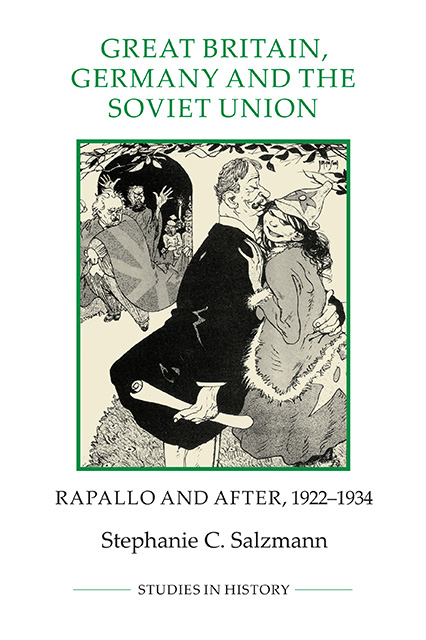Book contents
- Frontmatter
- Contents
- Acknowledgements
- Abbreviations
- Introduction
- 1 ‘It Nearly Overthrew the Applecart’: Lloyd George and the Treaty of Rapallo
- 2 ‘The Most Important Event Since the Armistice’: The Foreign Office and Rapallo
- 3 Rapallo’s First Test: The Ruhr Crisis
- 4 The Policy of Conciliation: Rapallo and the First Labour Government
- 5 The Battle for the German Soul: Locarno and the Treaty of Berlin
- 6 Rapallo and the Rupture of Anglo-Soviet Relations
- 7 Rapallo and the Decline of the Locarno Spirit
- 8 An Economic Rapallo?
- 9 Rapallo and the Disarmament Conference
- 10 The Rapallo Relationship and Hitler’s Rise to Power
- 11 The End of Rapallo: The German–Polish Non-Aggression Treaty
- Conclusion
- Bibliography
- Index
2 - ‘The Most Important Event Since the Armistice’: The Foreign Office and Rapallo
Published online by Cambridge University Press: 25 March 2023
- Frontmatter
- Contents
- Acknowledgements
- Abbreviations
- Introduction
- 1 ‘It Nearly Overthrew the Applecart’: Lloyd George and the Treaty of Rapallo
- 2 ‘The Most Important Event Since the Armistice’: The Foreign Office and Rapallo
- 3 Rapallo’s First Test: The Ruhr Crisis
- 4 The Policy of Conciliation: Rapallo and the First Labour Government
- 5 The Battle for the German Soul: Locarno and the Treaty of Berlin
- 6 Rapallo and the Rupture of Anglo-Soviet Relations
- 7 Rapallo and the Decline of the Locarno Spirit
- 8 An Economic Rapallo?
- 9 Rapallo and the Disarmament Conference
- 10 The Rapallo Relationship and Hitler’s Rise to Power
- 11 The End of Rapallo: The German–Polish Non-Aggression Treaty
- Conclusion
- Bibliography
- Index
Summary
‘We seem to be relapsing in the case of all the great continental powers into the deepest slime of pre-war treachery and intrigue’, fumed foreign secretary Curzon when learning of the Rapallo treaty.
Tempers ran high in Britain over the German–Russian agreement. The indignation among London decision-makers was unanimous. The news of the Rapallo treaty came out of the blue for the Foreign Office on 18 April 1922. It was clear from the outset that Germany was blamed as the principal culprit in the agreement. After all, the German government was at least indirectly responsible for the existence of Bolshevism in Europe, for Berlin had permitted the passage of Lenin from Zürich to Russia in 1917, after Britain and France had specifically vetoed his journey. It was, however, not so much the Rapallo treaty as such, or the contents of the agreement, which created such a stir in Whitehall. Rather, the Foreign Office slowly but surely realised that it had fallen victim to the policy initiated by Lloyd George. Moreover, it shared responsibility with the prime minister for the international disturbances caused by the German–Russian agreement because it had overlooked incoming warnings.
The British prime minister’s aversion to diplomatic channels was well known. Consequently, he tended to by-pass the Foreign Office in important decisions, and instead consulted his personal entourage – the Cabinet Office and his private secretariat. The Foreign Office’s influence, steadily declining since 1914, was reduced further after the war. Lloyd George preferred ‘diplomacy by conference’ where he could talk matters over with his counterparts from other countries. Foreign Office advice was neither sought nor desired. In addition, there were personal animosities between the prime minister and the foreign secretary as well as rivalries with other Whitehall departments. After the end of the war, the War Office, the Treasury and the Board of Trade had curtailed Foreign Office competencies by assuming part of its functions. As far as military issues relating to Germany were concerned, a further body, the Inter-Allied Military Control Commission (IMCC) was in charge. Thus, structural shortcomings in Whitehall gave the impression of confusion in day-to-day political business: it seemed that nobody knew who took responsibility for what types of political events.
The Foreign Office’s largest and most difficult problem was their dearth of information about the prime minister’s foreign policy objectives and activities.
- Type
- Chapter
- Information
- Great Britain, Germany and the Soviet UnionRapallo and after, 1922-1934, pp. 19 - 32Publisher: Boydell & BrewerPrint publication year: 2002



